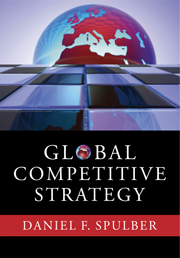Global Competitive Strategy
Globalization has fundamentally changed the game of business. Strategic frameworks developed for the analysis of purely domestic business necessarily fall short in the international business context. Managers and business students require alternative approaches to understand and cope with these far-reaching changes. We must learn to think globally in order to succeed. Global Competitive Strategy shows how we can do this by providing a unique set of strategic tools for international business. Such tools include the 'star analysis' that allows strategy makers to integrate geographic information with market information about the global business environment. Also introduced is the 'global value connection' that shows managers how to account for the gains from trade and the costs of trade. Aimed at MBA students taking courses in international strategy, consultants and practising managers with responsibility for strategic development, this 2007 book offers a comprehensive strategic framework for gaining competitive advantage in the global marketplace.
- Provides an original set of strategic decision making tools including the 'star analysis'
- Contains four extended case studies
- Extensive auxiliary material including PowerPoint slides and multiple-choice questions
Reviews & endorsements
"In our fiercely competitive global landscape, it is critical to stay several steps ahead of the trends, markets and technologies that ensure success. Daniel Spulber’s insightful methodology is a must-read for international business managers looking for a strategic advantage." - Bill McDermott, President & CEO, SAP Americas
“Caterpillar is thriving today not because we survived globalization, but because we embraced it. We must look at globalization and international competition as an opportunity to make ourselves stronger and more efficient. Global Competitive Strategy provides managers with a highly valuable guide to business strategy in the global economy.” - Dr. James W. Owens, Chairman and CEO, Caterpillar, Inc.
“Managers face competitive challenges in the best of times, but globalization raises the level of those challenges exponentially. Using the best from modern research, world-class economist Daniel Spulber unravels these managerial challenges and offers keys to competing successfully in the global market. Throughout the book, he ties real-world problems to rigorous theory with sharp-edged but accessible analysis, lively but always clear prose, and fascinating case studies that range from Chinese computers to Mexican cement to Japanese cars.” - J. Mark Ramseyer, Mitsubishi Professor of Japanese Legal Studies, Harvard University
“Global Competitive Strategy is a great work. With its focus on the tremendous increase in global competition and the variety of global markets, the book makes a major contribution to management strategy. I highly recommend it to teachers and students of global business.” - Yoshiro Miwa, Professor of Economics, University of Tokyo
“In short, the book is a gem.... a source of information for the economically interested reader and a must-read for managers.... Without doubt, this book will find its way onto many global bookshelves.” - Wolfgang Gick, Journal of Economic Geography
"Ideas in Spulber's book are presented clearly. They are introduced in a logical order and each is well explained; giving the reader a solid grasp of its importance and context. [...]Spulber's book provides a solid contribution to its field. The work introduces a substantial amount of new and innovative material." - Anthony M. Gould, Laval University, Industrial Relations
Product details
July 2011Paperback
9780521367981
306 pages
244 × 170 × 16 mm
0.49kg
Available
Table of Contents
- List of figures
- List of tables
- Preface
- Acknowledgements
- Introduction: the global challenge
- 1. The global mosaic
- 2. Global strategic analysis
- 3. Global competitive advantage
- 4. Global competitive strategy
- 5. Global investment strategy: choosing the best mix of transactions and investment
- 6. The global business organization
- 7. Lenovo: entering global competition
- 8. Cemex: making global markets
- 9. Dairy farm: regional retail strategy
- 10. Danone: organizing for global competition
- Conclusion.







